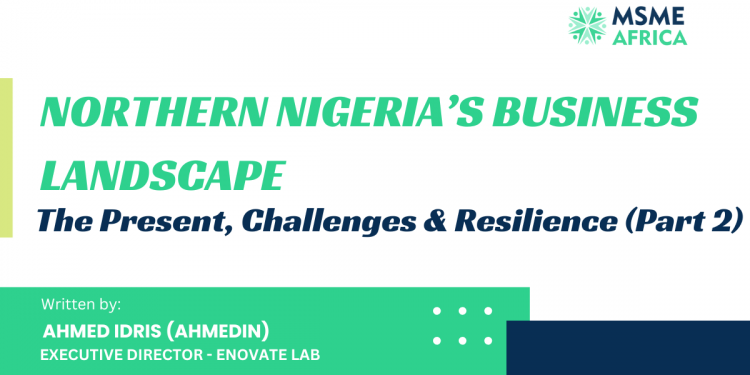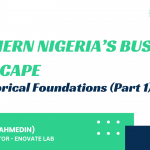Step into Kantin Kwari Market in Kano, and you’re hit with an explosion of color and energy. The air buzzes with activity—the clack-clack of old sewing machines, traders shouting prices over stacks of vibrant atampa cloth, and customers rubbing fabric between their fingers to test quality. Towering piles of textiles form rainbow-colored walls along the narrow aisles. This isn’t just West Africa’s largest textile market—it’s Northern Nigeria’s economy in one crowded place. Over there, bales of local cotton sit forgotten beside shiny Chinese imports. Outside, trucks groan under sacks of textile materials, waiting to cross into Niger and Chad, just as they’ve done for generations. That stubborn hustle you see here? It’s how the North survives—through power cuts, smuggling wars, and decades of boom and bust. But survival isn’t enough anymore. While traders here still move goods the old-fashioned way, a quiet digital revolution is taking root beyond these market walls. The question hanging in the air, thick as the dust from grinding mills, is simple: Can this region, famous for its trading savvy, learn new tech tricks before it’s too late?
Agriculture: Breadbasket Under Siege
Northern Nigeria continues to feed the nation; its vast fields yield 82% of Nigeria’s sorghum, 75% of its sesame seeds, and, remarkably, 60% of its wheat. This is a testament to farmers mastering arid soils where others see only hardship. The success of Jigawa and Kebbi as rice-growing hubs, fueled by over ₦1 trillion in loans from the Central Bank’s Anchor Borrowers’ Programme since 2015, shows what’s possible. Yet this agricultural backbone is fracturing: in Sokoto, farmers hand over “protection money” to armed groups just to tend their fields, while Kebbi’s rice production collapsed by 40% in 2022 amid rising violence. “We plant our crops to the sound of gunfire,” says Ibrahim Musa, a Zamfara millet farmer whose weathered hands tell years of struggle, “but hunger leaves us no other path.” The cruel paradox emerges – the region that grows Nigeria’s food struggles to protect those who grow it.
Trade: The Informal Engine
Northern Nigeria’s economic pulse beats strongest in its sprawling markets, where centuries of commercial tradition meet modern trade. The legendary Kantin Kwari in Kano—a maze of over 10,000 stalls—churns through ₦5 billion worth of textiles and goods each month, its alleys buzzing with traders from across West Africa. Just kilometers away, the Dawanau Grain Market serves as the region’s breadbasket, supplying 70% of West Africa’s cereals to countries as far as Libya and Mauritania. Yet beneath this vibrant informal economy lies a structural weakness: fewer than 1 in 10 businesses are officially registered, locking them out of formal credit systems and leaving generations of traders dependent on personal savings and informal lenders. This paradox of enormous commercial activity operating outside the formal financial system represents both the resilience and limitations of Northern Nigeria’s market-led growth model.
Minerals: The Untapped Jackpot
The region sits atop a buried fortune that could transform its economy—if it could only harness it. Geological surveys suggest Zamfara’s gold belt contains untapped reserves worth $750 billion, enough to bankroll national development for decades. Meanwhile, Nasarawa’s lithium deposits—the very mineral powering the world’s electric vehicle revolution—lie waiting for industrial-scale extraction. But this underground wealth remains a curse rather than a blessing: an estimated 97% of the region’s gold is illegally mined and smuggled out through shadowy networks, with proceeds often financing the armed groups terrorizing mining communities. The tragic irony is inescapable—the minerals that could build Northern Nigeria’s future are instead fueling its instability, trapped in a cycle of plunder and violence that benefits everyone but the people who live atop these riches.
The New Industrialists
Two of Nigeria’s wealthiest industrialists—both sons of Northern Nigeria—carry the region’s mercantile legacy into global boardrooms, even as their hometowns await promised trickle-down benefits. Abdul Samad Rabiu, scion of Kano’s legendary Khalifa Isyaku Rabiu’s family, has built his $8 billion BUA empire primarily in Southern cement plants and ports. Aliko Dangote, another Kano native, operates Africa’s largest refinery near Lagos while pledging future Northern investments. Their success stories fuel both pride and pointed questions in the North: why do hometown heroes so rarely site major factories in the communities that shaped them? ‘We invest where infrastructure exists,’ Dangote told the BBC in 2023—a diplomatic explanation that underscores the region’s crippling disadvantages even for its most favored sons.
The Obstacles: A Ticking Clock
Three formidable barriers threaten to derail economic progress in the region. Rampant insecurity has forced more than 3,000 farmers off their land in just one year, crippling agricultural output and swelling urban slums with displaced families. Crumbling infrastructure compounds these challenges—only 30% of roads meet basic paving standards, causing transport costs to triple as trucks navigate moonscapes of potholes and washed-out bridges. Most alarmingly, youth unemployment has reached 45% in key states, creating a tinderbox of idle hands and frustrated ambitions that militant groups actively recruit from. These crises feed on each other in a dangerous cycle: violence scares away investors, poor roads strangle commerce, and jobless youth become easy targets for radicalization. The clock is ticking—without coordinated solutions, this perfect storm of challenges could condemn the region to decades of stunted growth and instability.
Hubs and Startups: A Revolution
Across the region, a new wave of tech hubs like Enovate Lab is nurturing a generation of coders and entrepreneurs eager to drive digital transformation. Yet chronic power outages—sometimes lasting 18 hours daily—strangle this potential in its cradle. “You can’t build the future in darkness,” explains Amina Garba, founder of a Bauchi-based agritech platform, as she checks her solar battery for the third time that morning. Her question—”How do you run a startup with 3 hours of electricity a day?”—echoes through co-working spaces where developers huddle around power banks and routers blink intermittently between blackouts. While these tech hubs demonstrate the North’s untapped potential, Nigeria’s energy crisis threatens to sever the digital lifeline before it can truly transform the economy.
A Path Forward?
Breaking the cycle of underdevelopment will require bold, targeted interventions, according to economists and business leaders. First, formalizing the vast informal sector, where an estimated 80% of Northern workers currently operate, could unlock access to credit and government support, turning subsistence traders into growth-oriented businesses. Second, establishing secure, regulated mining zones would allow the region to finally benefit from its $750 billion in mineral wealth, rather than watching it fund armed groups through illegal channels. Most urgently, decentralized solar solutions must bypass Nigeria’s crumbling national grid, with microgrid projects already showing promise in powering farms and factories off-grid.










